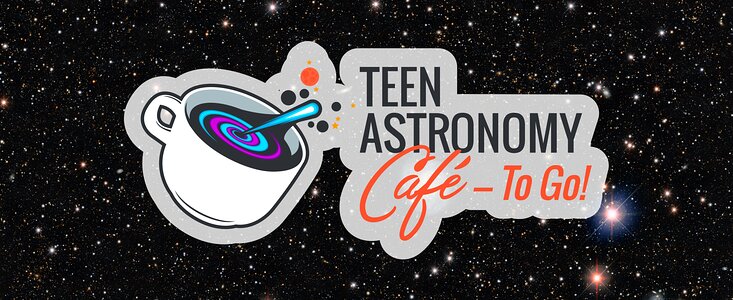NSF’s NOIRLab Launches “Teen Astronomy Café — To Go!”
The first five free digital education packages using real research data are now available
14 July 2022
NSF's NOIRLab’s Teen Astronomy Café educational program is proud to present its newest initiative: Teen Astronomy Café — To Go! This online, free program provides complete digital education packages, aligned with the Next Generation Science Standards, suitable for informal use by students alone and by classroom educators. Using science-grade data actively engages students and encourages them to think and act like scientists. Five ‘Instant Packs’ are now available, each focusing on a different astronomy research topic.
Since 2017 NSF’s NOIRLab’s Teen Astronomy Café has sought to bring the excitement of scientific discovery to learners of all ages, providing opportunities to explore astronomical data using the same tools as professional astronomers. Over the last two years, the Café adapted to the pandemic by moving its events online, which had the enormous benefit of making it accessible to audiences beyond Tucson, Arizona. The Teen Astronomy Café has now evolved once again with its new Teen Astronomy Café — To Go! program, which provides digital education ‘Instant Packs’ that can be used by anyone, at any time.
“The new Teen Astronomy Café — To Go! program is the most accessible iteration of the successful Teen Astronomy Café educational program yet,” said NOIRLab astronomy education specialist Justine Schaen, who is available to help teachers with these resources. “We look forward to sharing these with students throughout the world.”
Five ‘Instant Packs’ are now available, each focusing on a unique and fascinating topic: Gravitational Lensing, Breaking the Solar System, Exoplanet Atmospheres, Black Holes, and Black Hole Orbits. Every package includes:
- A pre-recorded presentation video by a scientific expert in that topic, who explains the concepts involved and how astronomers use observations and data to explore it;
- Presentation slides used in the pre-recorded video (many of the presentations also include presenter notes);
- An interactive Python Notebook (hosted in Google Colab), using real scientific data and tools, which allows learners to experience how professional astronomers work;
- A teacher guide; and,
- A student worksheet.
The Python Notebooks have been carefully developed by experts so that they can be run online with a few clicks in any up-to-date internet browser [1].
Teen Astronomy Café — To Go! can be used in a variety of settings — formal and informal, online and face-to-face — and is suitable for a range of learners and learning environments: advanced middle school through college classrooms, home-school students, self-study, museum classes, summer camps, and library programs. Teen Astronomy Café — To Go! provides a unique opportunity for teachers to implement the Next Generation Science Standards in their classroom.
Each ‘Instant Pack’ is designed to actively engage students and encourage them to think and act like scientists. For example, in the Breaking the Solar System Instant Pack, students develop a deeper understanding of orbiting objects and gravitational forces by using data to predict and simulate the stability of the Solar System. The goal is that, by making the sort of work that professional astronomers do an accessible experience, students will be inspired and encouraged to continue to study Science, Technology, Engineering, and Math (STEM) subjects or even pursue a career in STEM.
Notes
[1] Python is a programming language that many astronomers use in order to analyze data or develop models. Knowledge of programming is not a prerequisite for participating.
More information
NSF’s NOIRLab(National Optical-Infrared Astronomy Research Laboratory), the US center for ground-based optical-infrared astronomy, operates the International Gemini Observatory(a facility of NSF, NRC–Canada, ANID–Chile, MCTIC–Brazil, MINCyT–Argentina, and KASI–Republic of Korea), Kitt Peak National Observatory (KPNO), Cerro Tololo Inter-American Observatory (CTIO), the Community Science and Data Center (CSDC), and Vera C. Rubin Observatory(operated in cooperation with the Department of Energy’s SLACNational Accelerator Laboratory). It is managed by the Association of Universities for Research in Astronomy (AURA) under a cooperative agreement with NSF and is headquartered in Tucson, Arizona. The astronomical community is honored to have the opportunity to conduct astronomical research on Iolkam Du’ag (Kitt Peak) in Arizona, on Maunakea in Hawai‘i, and on Cerro Tololo and Cerro Pachón in Chile. We recognize and acknowledge the very significant cultural role and reverence that these sites have to the Tohono O'odham Nation, to the Native Hawaiian community, and to the local communities in Chile, respectively.
Contacts
Justine Schaen
Astronomy Education Specialist
NSF’s NOIRLab
Email: justine.schaen@noirlab.edu
Amanda Kocz
Communications Manager
NSF’s NOIRLab
Tel: +1 520 318 8591
Email: amanda.kocz@noirlab.edu


